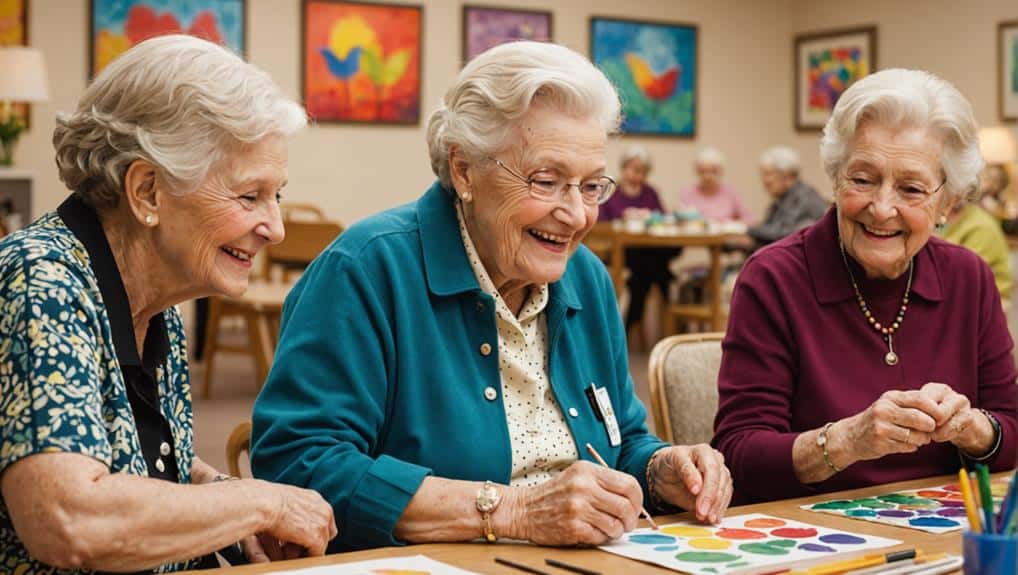Activity coordinators play an essential role in care homes by planning and organizing activities that enhance residents' quality of life. They create chances for community engagement through outings, games, and arts and crafts. Engaging activities reduce feelings of isolation and can even help delay cognitive decline. Coordinators possess strong communication, organization, and creativity skills, which allow them to cater to individual preferences effectively. Their collaboration with local community groups enriches the variety of activities available. Overall, these coordinators foster social interaction and enrich community life, making a significant impact on residents' well-being. You'll find more insights on their important role shortly.
Role of an Activity Coordinator
In addition to planning, Activity Coordinators also organize outings. They handle all the logistics, from transportation to scheduling, to facilitate community engagement. This not only encourages social interaction but also helps residents feel more connected to the world outside the care home. Strong team collaboration is essential here, as coordinators often work with local community groups to create enriching events and fundraising opportunities. Effective home care support services can further complement these activities, providing additional resources for residents. To excel in this role, you'll need essential skills such as strong communication, organization, and creativity. It's also common for coordinators to have qualifications like GCSEs in Maths and English, plus specific training during their induction period. The combination of these skills and qualifications enables you to foster an environment where residents can thrive socially and emotionally.
Ultimately, an Activity Coordinator plays a crucial role in enhancing the lives of care home residents by ensuring they remain engaged, valued, and connected to their community.
Activities Offered in Care Homes
Here are some popular activities you might find in a care home:
- Arts and Crafts: Engage your creative side with painting, knitting, or scrapbooking. These activities not only foster creativity but also encourage social interaction among residents, enhancing their emotional well-being. For instance, specialized dementia programs often incorporate arts and crafts to boost cognitive stimulation.
- Bingo and Quizzes: Enjoy friendly competition while sharpening your memory and social skills.
- Specialized Dementia Programs: Participate in tailored activities that enhance cognitive stimulation for residents with dementia.
- Outings: Join regular shopping trips or visits to local attractions, all accessible via a chauffeured minibus service.
- Games and Puzzles: Challenge your mind with board games, card games, or jigsaw puzzles, fostering both fun and social interaction.
These activities are designed to be inclusive and often come at no extra cost, promoting everyone to participate without financial barriers. By engaging in these programs, you'll not only find enjoyment but also build meaningful connections with others in the community. The variety guarantees that there's something for everyone, whether you prefer quiet, solitary activities or lively group events. The focus on artistic expression and cognitive development helps create a vibrant atmosphere where residents can thrive, making life in a care home both fulfilling and enjoyable.
Significance of Engagement
Regular social interaction is crucial for everyone's mental health and can reduce feelings of boredom and isolation. Studies show that staying active and engaging with others can even delay cognitive decline. By joining in on group activities, you create bonds with fellow residents, fostering a sense of community that enriches your daily life. A well-structured care service, like personalized care approach, guarantees that these activities are tailored to meet individual preferences, enhancing participation and satisfaction.
Moreover, activity coordinators work hard to guarantee that there's a variety of activities available, catering to different preferences and needs. This diversity encourages not only social interaction but also physical activity, which promotes overall health and mobility. Whether it's a dance class, gardening, or game night, these experiences can uplift your spirits and keep you engaged.
In essence, the significance of engagement in care homes cannot be overstated. It's more than just passing the time; it's about enhancing emotional wellbeing and building connections with others. By actively participating in structured activities, you're not only enriching your life but also contributing to a vibrant community of support and friendship.
Skills and Qualifications Needed
Creativity is another crucial component of your role. You'll need to develop engaging programs that capture the attention of residents and encourage their participation. Many positions in activity coordination also benefit from prior experience or qualifications in fields such as Fine Art or Health and Social Care. Additionally, local knowledge can be advantageous for organizing community events that foster connections and enhance resident engagement. Providing personalized service is essential to meet the unique needs of each resident. Here are some skills and qualifications you should consider:
- Good verbal and written communication skills
- Strong organizational abilities to manage schedules and resources
- Experience with training programs focused on elderly care
- Creative strategies for designing activities that appeal to residents
- Knowledge of health and safety regulations in care settings
Community Involvement and Impact
Your collaboration with local businesses for fundraising and resource sharing further strengthens these ties. This partnership leads to a wider variety of activities, ensuring residents can participate in events that resonate with their interests and past experiences. Regular involvement from the local community promotes a supportive environment, enhancing the overall quality of life for residents through shared experiences.
Here's a visual representation of the impact of community involvement:
| Community Connections | Activities Offered | Benefits to Residents |
|---|---|---|
| Local schools | Art and craft sessions | Stimulates creativity and expression |
| Charitable organizations | Fundraising events | Fosters a sense of purpose |
| Neighborhood groups | Social gatherings | Builds friendships and support |
| Local businesses | Workshops and classes | Encourages lifelong learning |





